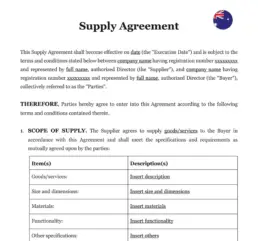The Importance of a Supplier Contract
In Australia, businesses of all sizes rely on a steady and reliable supply chain to operate effectively. Whether you’re sourcing raw materials, finished goods, or services, the foundation of a strong business relationship lies in a clear and comprehensive Supplier Contract. This document outlines the terms and conditions under which the supplier will provide goods or services, ensuring that both parties have a mutual understanding of their obligations.
A Supplier Contract is crucial because it helps to mitigate risks, set expectations, and establish legal protections for both the supplier and the buyer. Without a properly drafted agreement, misunderstandings can arise, leading to disputes, delays, or even legal action. If you’re involved in any form of business transaction, drafting an effective Supply Agreement is as essential as protecting your business’s intellectual property. For related insights, our article on Documenting Business Understandings with MoUs provides guidance on preliminary agreements that can set the stage for detailed contracts.
Key Components of a Supplier Contract
A well-structured Supplier Contract should include several key components that clearly define the relationship between the supplier and the buyer.
1. Parties Involved: Clearly state the names and addresses of the parties involved in the agreement. This section should specify the supplier and the buyer, including any subsidiaries or affiliates that are relevant to the contract.
2. Description of Goods or Services: Provide a detailed description of the goods or services being supplied. This should include specifications, quality standards, quantities, and any other relevant details that ensure both parties understand what is being delivered.
3. Pricing and Payment Terms: Outline the pricing structure for the goods or services, including any discounts, taxes, and payment terms. This section should specify the payment due dates, methods of payment, and any penalties for late payments.
For more on structuring agreements, our article on Drafting Effective Building Agreements in Australia offers insights into creating contracts that protect your interests.
Delivery and Acceptance Terms
The Supplier Contract should include detailed delivery and acceptance terms to prevent any disputes related to the timing or quality of the goods or services provided.
1. Delivery Schedule: Specify the delivery schedule, including the dates and locations for delivery. This section should also address any requirements for transportation, packaging, and insurance.
2. Acceptance Criteria: Define the criteria for accepting the goods or services upon delivery. This might include inspection procedures, quality control standards, and the process for rejecting non-conforming goods.
3. Risk of Loss: Outline the point at which the risk of loss or damage to the goods passes from the supplier to the buyer. This is typically when the goods are delivered to the buyer’s location or when they are handed over to a third-party carrier.
Warranties and Representations
Including warranties and representations in your Supplier Contract is essential to protect your business from defective products or substandard services.
1. Supplier Warranties: The supplier should provide warranties regarding the quality, performance, and compliance of the goods or services with applicable laws and regulations. This might include warranties against defects, warranties of merchantability, or warranties of fitness for a particular purpose.
2. Buyer’s Rights: Clearly outline the buyer’s rights in the event that the goods or services do not meet the agreed-upon specifications. This could include the right to repair, replacement, or refund, as well as the right to terminate the agreement in certain circumstances.
3. Limitations of Liability: Address any limitations of liability for both parties, including caps on damages, exclusions of certain types of losses, and indemnification clauses
Confidentiality and Intellectual Property
In some cases, your Supplier Contract may involve the exchange of confidential information or intellectual property. It’s crucial to address these aspects in your contract to protect your business.
| ➤ Confidentiality Clause: Include a confidentiality clause that requires both parties to keep any sensitive information disclosed during the course of the agreement confidential. This could include trade secrets, proprietary information, or any other non-public information. |
| ➤ Intellectual Property Rights: Define the ownership and usage rights for any intellectual property that is created or shared as part of the supply relationship. This could include patents, trademarks, copyrights, or designs that are used in the production of the goods or services. |











